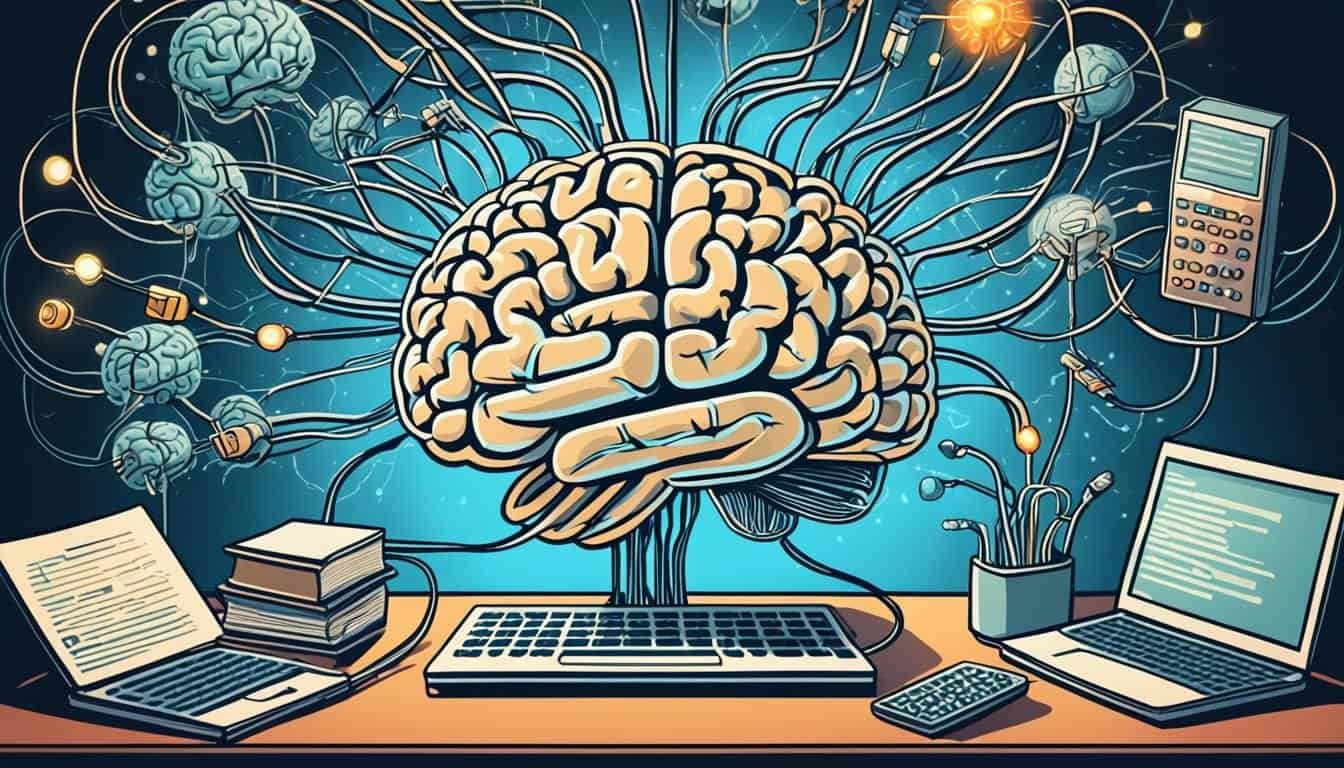Harness the Power of Mind Learning Today
“Education is the most powerful weapon which you can use to change the world.” – Nelson Mandela
Are you looking to unlock your full potential and achieve lasting improvement in cognitive skills and mental acuity? Harnessing the power of mind learning can help you enhance memory, boost cognitive function, and develop a growth mindset. By utilizing brain training techniques and learning strategies, you can tap into your brain’s remarkable capacity for neuroplasticity and drive cognitive enhancement.
Key Takeaways:
- Cognitive skills development can be achieved through mind learning techniques.
- Brain training and neuroplasticity exercises are effective strategies for improving memory and mental acuity.
- Mind learning promotes mindset development and supports cognitive function enhancement.
- Unlock your potential by harnessing the power of mind learning and embracing a growth mindset.
- Continuous learning and cognitive training methods are essential for personal and professional growth.
The Power of Pause: Creating Mind-Body Connection.
The power of pause is a transformative practice that allows individuals to harness the mind-body connection and cultivate self-mastery. It provides a valuable opportunity to create space between external stimuli and our reactions, enabling us to respond consciously and authentically. By incorporating grounding techniques and emotional regulation, we can unlock a heightened state of conscious presence.
At its core, the power of pause encompasses the art of slowing down and pausing to reflect before responding. This intentional pause allows us to break free from automatic patterns of triggered emotional reactions and impulsive behaviors. Through this practice, we gain the power to choose our responses rather than being driven by instinct alone.
Grounding techniques are effective tools that anchor us to the present moment, helping us connect with our bodies and surroundings. One such technique involves focusing on the solar plexus, the area above the navel and below the ribcage. By directing our attention to this center of energy, we can ground ourselves and promote a sense of stability and calm.
Breath awareness is another powerful grounding technique that can deepen our mind-body connection. By consciously focusing on our breath, we bring ourselves back to the present moment and reconnect with our bodies. Paying attention to each inhale and exhale allows us to regulate our emotions, promoting a state of calm and clarity.
The Dance Between Instinct and Intellect
Incorporating grounding techniques into our daily lives enables us to find balance between our instinctual and intellectual selves. The mind-body connection serves as a gateway to harmonizing these two vital aspects of our existence.
While our instinctual responses are necessary for survival, they can sometimes hinder conscious decision-making and lead to impulsive actions driven solely by emotions. By cultivating self-mastery through the power of pause, we can tap into our intellectual capacities and make well-informed decisions that align with our values and goals.
Emotional Regulation and Self-Mastery
Emotional regulation is an essential component of the power of pause. When we pause and take control of our emotions, we gain the ability to respond instead of react. This enables us to consciously choose our behaviors, fostering healthier relationships and a greater sense of self-mastery.
Through consistent practice, the power of pause enhances our emotional intelligence and empowers us to navigate challenging situations with grace and clarity. Instead of being overwhelmed by emotions, we can respond in a calm and composed manner, leading to positive outcomes and meaningful connections.
Cultivating Conscious Presence
By embracing the power of pause and grounding techniques, we cultivate a state of conscious presence. This allows us to fully inhabit the present moment, releasing attachment to past regrets or future worries. In this state, we become more attuned to ourselves and the world around us, fostering a deeper connection with our true essence.
The practice of conscious presence invites us to let go of distractions and cultivate self-awareness. As we become more present, we can engage with the people and experiences in our lives with authenticity and intention. This deepened level of connection brings forth a sense of fulfillment, purpose, and inner peace.
Incorporating the Power of Pause into Daily Life
Mindful integration of the power of pause into our daily lives can have transformative effects on our well-being and overall quality of life. Here are some simple yet powerful ways to incorporate this practice:
- Set aside designated moments each day to pause, breathe, and reconnect with your body and mind.
- Practice mindfulness meditation to cultivate present moment awareness and train your mind to pause and observe.
- Engage in activities that promote self-reflection, such as journaling or practicing gratitude.
- Explore different grounding techniques, such as focused breathing or connecting with nature.
- Seek support from mindfulness-based therapies or workshops to deepen your understanding and practice.
| Benefits of the Power of Pause | Grounding Techniques |
|---|---|
| Enhanced emotional regulation | Focusing on the solar plexus |
| Heightened self-awareness | Breath awareness |
| Improved decision-making | Connecting with nature |
| Stress reduction | Focused breathing |
| Greater self-mastery |
Unleashing the Potential of Personal Development.
Personal development is the key to unlocking your true potential and living a fulfilling life. It is a lifelong journey of self-discovery, growth, and improvement. By investing time and effort in personal development, you can become more self-aware, develop your strengths, overcome weaknesses, and cultivate essential skills like effective communication and leadership.
Self-awareness is the cornerstone of personal development. It involves taking a step back and examining yourself, your thoughts, emotions, and actions. By gaining a deeper understanding of yourself, you can identify your strengths and weaknesses and harness them to your advantage. Self-awareness allows you to make better decisions, set meaningful goals, and develop resilience in the face of challenges.
Leadership skills are another vital aspect of personal development. Effective communication, the ability to motivate others, and the capacity to inspire are key qualities of successful leaders. By honing your leadership skills, you can create positive change, influence others, and make a significant impact in both your personal and professional life.
Motivation plays a crucial role in personal development. It is the driving force that propels you forward and helps you overcome obstacles. Cultivating a positive mindset and staying focused on your goals can fuel your motivation and keep you on track, even in the face of setbacks.
Developing a positive mindset is essential in personal development. It involves cultivating optimism, resilience, and a belief in your abilities. A positive mindset not only helps you navigate through challenges but also attracts positive experiences and opportunities into your life.
“Personal development is the key to unlocking your true potential and living a fulfilling life.”
The Benefits of Personal Development
When you invest in personal development, you open yourself up to a world of possibilities. Here are some of the benefits you can expect to experience:
- Self-awareness: By becoming more self-aware, you gain a deeper understanding of yourself and your motivations.
- Growth: Personal development fosters personal growth and helps you evolve into the best version of yourself.
- Improved relationships: Effective communication and emotional intelligence are key skills you can develop through personal development, leading to better relationships with others.
- Confidence: Personal development helps you build confidence in yourself and your abilities, enabling you to pursue your goals with enthusiasm.
By embracing personal development, you empower yourself to take control of your life and create a future filled with success, happiness, and fulfillment.
| Key Elements of Personal Development | Benefits |
|---|---|
| Self-awareness | Gain insight into your strengths and weaknesses |
| Leadership skills | Influence and inspire others, make a significant impact |
| Motivation | Stay focused on goals, overcome obstacles |
| Positive mindset | Cultivate optimism, attract positive experiences |
The Role of Mindset in Fitness Success.
A strong mindset is crucial for achieving success in fitness. It goes way beyond physical strength and endurance; mindset shapes our attitude, motivation, and ability to overcome challenges. By developing a mindset focused on progress and positivity, we can unlock our full potential and achieve our fitness goals.
One key aspect of a successful mindset in fitness is motivation. It acts as the driving force behind our actions and keeps us committed to our fitness journey. Whether it’s the desire to lead a healthier lifestyle, improve athletic performance, or simply feel better in our bodies, finding the right motivation is essential.
However, motivation can sometimes wane, especially when we encounter plateaus or obstacles along the way. This is where a positive outlook comes in. Maintaining a positive mindset allows us to see setbacks as opportunities for growth and learning, rather than reasons to give up. It helps us stay focused on our long-term vision and persevere through the challenges.
“The journey of fitness is not just about instant results; it’s about the ongoing progress and personal growth.”
The mindset of embracing the journey rather than fixating on instant results is known as the journey mindset. Instead of being discouraged by plateaus, the journey mindset helps us stay invested in our progress. It encourages us to set realistic and achievable fitness goals, while celebrating every milestone along the way.
Developing a journey mindset requires a shift in perspective. Rather than solely focusing on the end point, we learn to enjoy the process of getting there. We find joy in trying new workouts, exploring different fitness activities, and improving our overall fitness levels.
Benefits of a Positive Mindset in Fitness
A positive mindset in fitness brings numerous benefits. It enhances our overall well-being, improves our mental and emotional health, and helps us maintain long-term fitness habits.
- Increased motivation: A positive mindset fuels our motivation to work towards our fitness goals consistently.
- Improved performance: When we approach our workouts with a positive outlook, we can push ourselves to achieve more and improve our athletic performance.
- Enhanced resilience: A positive mindset helps us bounce back from setbacks and challenges, allowing us to keep going even when the going gets tough.
- Greater enjoyment: By focusing on the positive aspects of our fitness journey, we can find more joy and satisfaction in the process.
- Boosted confidence: Embracing a positive mindset builds confidence in our abilities, enabling us to take on new challenges and push our limits.
Cultivating a Positive Mindset in Fitness
Cultivating a positive mindset in fitness is a journey in itself. It requires self-awareness, intentional effort, and a commitment to personal growth. Here are some strategies to help you foster a positive mindset:
- Set realistic and achievable fitness goals: By setting goals that are specific, measurable, attainable, relevant, and time-bound (SMART), you set yourself up for success and boost your confidence along the way.
- Practice gratitude: Take the time to appreciate and be grateful for your body’s capabilities and the progress you’ve made. Focus on what you can do instead of what you can’t.
- Surround yourself with positivity: Surround yourself with supportive and encouraging individuals who uplift and inspire you on your fitness journey. Seek out fitness communities, online or offline, for added motivation and camaraderie.
- Embrace self-care: Prioritize self-care practices that nourish your mind, body, and soul. This can include activities such as meditation, mindfulness, adequate sleep, and stress management.
- Challenge negative self-talk: Replace self-defeating thoughts with positive affirmations and constructive self-talk. Remind yourself of your strengths and capabilities.
- Celebrate small victories: Acknowledge and celebrate each milestone and achievement, no matter how small. Recognize that progress is a journey consisting of many steps.
By adopting a positive mindset, you can transform your fitness journey into a sustainable and fulfilling adventure. Remember, it’s not just about reaching your fitness goals; it’s about embracing the process, celebrating your progress, and enjoying the transformative power of fitness.
Cultivating a Positive Mindset in Fitness.

Achieving fitness goals goes beyond physical training and nutrition; it also requires cultivating a positive mindset. Our thoughts and beliefs can greatly shape our fitness journey and ultimately determine our success. By becoming aware of negative thoughts and challenging our inner-critic, we can shift our mindset towards a more empowering and optimistic perspective. Let’s explore some techniques to cultivate a positive mindset in fitness.
Self-Awareness Exercise: Journaling Negative Thoughts
One effective self-awareness exercise in cultivating a positive mindset is journaling negative thoughts. Take a moment each day to write down any negative thoughts or self-critical beliefs that arise during your fitness journey. By documenting these thoughts, you gain clarity on your self-defeating patterns and triggers.
Questioning the Inner-Critic
“You are your own worst critic.” – Unknown
The inner-critic is that critical voice within us that often undermines our confidence and progress. When negative thoughts arise, ask yourself, “Would I speak to my best friend this way?” By bringing awareness to the harsh and unrealistic expectations we place on ourselves, we can begin to challenge and quiet the inner-critic.
Replacing Negative Thoughts with Positive Alternatives
Once you’ve identified negative thoughts, it’s time to replace them with positive alternatives. For every negative thought, find a positive and empowering statement to counteract it. For example, instead of thinking, “I’ll never be able to run a marathon,” reframe it to, “I am capable of achieving my fitness goals with dedication and perseverance.”
Reversing Negative Thoughts: The Power of Reframing
Another powerful technique in cultivating a positive mindset is reframing negative thoughts. Instead of dwelling on what you can’t do or what went wrong, focus on the opportunities and lessons learned. Embrace challenges as growth opportunities and view setbacks as temporary detours on your fitness journey.
| Negative Thought | Positive Reframe |
|---|---|
| I’m too tired to work out. | Exercise energizes and revitalizes me. |
| I’ll never achieve my fitness goals. | I am making progress towards my fitness goals every day. |
| I don’t have time for exercise. | I prioritize my health and make time for exercise. |
The Power of a Positive Mindset in Fitness
Cultivating a positive mindset in fitness is a game-changer. It boosts motivation, strengthens resilience, and enhances overall well-being. Embrace the power of self-awareness exercises, challenge your inner-critic, replace negative thoughts with positive alternatives, and reframe setbacks. By nurturing a positive mindset, you’ll not only achieve your fitness goals but also find joy and fulfillment throughout your journey. Remember, a positive mindset is the driving force that propels you towards your best self.
Exploring Resources for Personal Development.
When it comes to personal development, there is a wealth of resources available to support individuals on their journey of growth and self-improvement. Whether you are looking for guidance, inspiration, or practical tools, these resources can provide valuable insights and help you unleash your full potential.
Books on personal development:
- Reading books on personal development is an excellent way to gain new perspectives and learn practical strategies for personal growth. These books often offer valuable insights from experts in the field, sharing their knowledge and experiences to empower individuals on their journey. Some recommended reads include:
- “The 7 Habits of Highly Effective People” by Stephen R. Covey
- “Mindset: The New Psychology of Success” by Carol S. Dweck
Workshops and seminars:
Attending workshops and seminars focused on personal development and leadership can be a transformative experience. These events provide opportunities to learn from industry professionals, engage in interactive exercises, and connect with like-minded individuals on the same journey of growth. Some workshops to consider:
- “Unlock Your Potential: Personal Growth Workshop” by Mindful Living Strategies
- “Leadership Mastery Seminar” by Success Now
Mentorship:
Seeking mentorship from experienced individuals in your field of interest is a powerful way to accelerate personal growth. Mentors can offer guidance, share their expertise, and provide support as you navigate your own journey. Find mentors who have achieved success in areas you aspire to and reach out to them for mentorship opportunities.
Mindfulness practices:
Mindfulness practices, such as meditation, can help cultivate self-awareness, reduce stress, and cultivate a positive mindset. Engaging in mindfulness techniques on a regular basis can enhance focus, improve emotional well-being, and support personal development. Consider incorporating mindfulness practices into your daily routine.
“Mindfulness is the key to unlocking the full potential of personal development. By practicing mindfulness, we can cultivate self-awareness, develop resilience, and foster a positive outlook on life.”
Goal setting:
Achieving personal growth requires setting clear goals and working towards them. Setting SMART (Specific, Measurable, Achievable, Relevant, Time-bound) goals can provide direction, motivation, and a sense of accomplishment. Break down your long-term goals into smaller, actionable steps, and track your progress along the way.
Positive social network:
Surrounding yourself with a positive social network plays a vital role in personal development. Connect with individuals who inspire and support you in your journey. Share experiences, exchange ideas, and collaborate with like-minded individuals who share your commitment to personal growth.
The Impact of Personal Development on Leadership.
Personal development plays a crucial role in effective leadership. By prioritizing self-awareness, leaders gain a deep understanding of their strengths and areas for growth. This self-awareness empowers leaders to make informed decisions and navigate challenges with clarity and confidence.
Furthermore, strong communication skills are essential for effective leadership. Through personal development, leaders enhance their ability to articulate ideas, actively listen, and foster open dialogue. Effective communication creates a positive and collaborative environment, enabling teams to work cohesively towards shared goals.
By investing in personal development, leaders can strengthen relationships within their organization. Relationship building is a key aspect of effective leadership, as it fosters trust, respect, and loyalty among team members. By nurturing strong relationships, leaders create a supportive and inclusive company culture where everyone feels valued and motivated to perform their best.
A positive company culture is a direct result of personal development. When leaders prioritize their own growth, they inspire and encourage their teams to do the same. This commitment to personal development cultivates a positive environment where growth and learning are valued, leading to increased productivity and employee satisfaction.
Personal Development for Effective Leadership:
- Invest in self-awareness through practices such as mindfulness and self-reflection.
- Develop strong decision-making skills by seeking diverse perspectives and considering different options.
- Continuously enhance communication skills through active listening and effective verbal and written communication.
- Nurture relationships by building trust, providing feedback, and fostering a sense of belonging.
- Create a positive company culture by leading by example and prioritizing employee well-being and growth.
By embracing personal development, leaders can unlock their full potential and inspire their teams to reach new heights. The impact of personal development on leadership extends far beyond individual growth—it creates thriving organizations built on effective communication, strong relationships, and a positive company culture.
Harnessing the Power of Mind Learning: Tips and Action Steps.
To truly unlock the power of mind learning, it’s important to incorporate specific practices into your daily life. These practices can help strengthen your cognitive skills, enhance your memory, and improve your overall mental acuity. By consistently engaging in mind learning practices, cognitive exercises, mindfulness techniques, self-reflection, and intentional mindset shifting, you can embark on a transformative journey of personal growth and development.
Mind learning practices encompass a wide range of activities designed to stimulate and challenge your brain. You can engage in cognitive exercises that target different areas of cognition, such as puzzles, memory games, and problem-solving tasks. These exercises encourage neuroplasticity and promote the development of new neural connections, enhancing your cognitive function.
Mindfulness techniques are another powerful tool in harnessing the power of mind learning. These techniques, such as meditation, deep breathing, and body scan exercises, enable you to cultivate presence and awareness in the present moment. Mindfulness helps to calm the mind, reduce stress, and improve focus and attention, laying the foundation for effective learning and cognitive processing.
“Mindfulness is the key to unlocking the full potential of your mind. By being fully present and aware in the moment, you can tap into your innate abilities and achieve optimal cognitive performance.”
Self-reflection is an essential component of mind learning. Taking the time to reflect on your thoughts, emotions, and actions allows you to gain valuable insights into your patterns of thinking and behavior. Through self-reflection, you can identify areas for improvement, course-correct negative tendencies, and cultivate a deeper understanding of yourself.
Intentional mindset shifting is the process of consciously adopting a positive and growth-oriented mindset. By intentionally reframing negative thoughts, embracing constructive beliefs, and cultivating an optimistic outlook, you can transform your mindset and overcome self-limiting beliefs. This intentional mindset shifting empowers you to approach challenges with resilience and adopt a mindset of continuous growth and learning.
By actively incorporating these mind learning practices, cognitive exercises, mindfulness techniques, self-reflection, and intentional mindset shifting into your daily routine, you can unlock your brain’s full potential and embark on a remarkable journey of personal growth and cognitive enhancement.
The Transformational Journey of Personal Development.
Personal development is a journey of continuous learning, adaptation, and self-improvement. It is a transformative process that allows individuals to cultivate new skills, overcome challenges, and become the best version of themselves. This journey is not a destination but a lifelong commitment to personal growth and positive transformation.
Embracing a growth mindset is the key to unlocking the full potential of personal development. It is about believing in the power of continuous improvement and being open to change. With a growth mindset, individuals are more willing to embrace new possibilities, challenge themselves, and step out of their comfort zones.
Throughout the transformative journey of personal development, individuals engage in continuous learning to expand their knowledge, skills, and perspectives. They seek opportunities to acquire new insights, explore different areas of interest, and stay curious about the world around them. Through this commitment to learning, individuals not only broaden their horizons but also enhance their adaptability and resilience.
Adaptation is a fundamental aspect of personal development. As individuals grow and evolve, they learn to navigate through life’s challenges and embrace change. They develop the ability to adjust their mindset, behaviors, and approach to various situations. This adaptability allows for greater flexibility and enables individuals to thrive in ever-changing environments.
Self-improvement
Self-improvement is a core component of personal development. It involves actively working on enhancing one’s skills, qualities, and mindset. By setting goals, seeking feedback, and engaging in reflective practices, individuals can identify areas for improvement and take actionable steps towards personal growth.
A positive mindset is crucial throughout the journey of personal development. It is about maintaining an optimistic outlook and focusing on the opportunities rather than the obstacles. A positive mindset empowers individuals to face challenges with resilience, embrace setbacks as learning experiences, and maintain motivation and perseverance.
“The only way to do great work is to love what you do.” – Steve Jobs
Growth Mindset and Positive Transformation
A growth mindset is closely linked to positive transformation. By believing in the potential for growth and improvement, individuals can overcome self-limiting beliefs and achieve remarkable personal transformations. A growth mindset fuels a hunger for knowledge, encourages resilience, and fosters a proactive approach to personal growth.
Positive transformation occurs when individuals experience a profound shift in their mindset, capabilities, and overall well-being. It is an empowering process that enables individuals to tap into their inner potential, embrace their values, and live a fulfilling life aligned with their true purpose.
The Power of Personal Development
Personal development has the power to enrich every aspect of an individual’s life, from relationships and career to personal well-being and happiness. It equips individuals with the skills, mindset, and resilience to navigate life’s ups and downs with confidence and grace.
By embarking on a transformative journey of personal development, individuals can unlock their true potential, seize new opportunities, and experience a profound positive impact on their lives and the lives of those around them.
| Benefits of Personal Development | Keywords |
|---|---|
| Enhanced self-awareness | self-awareness |
| Improved emotional intelligence | emotional intelligence |
| Greater resilience and adaptability | resilience, adaptability |
| Increased motivation and productivity | motivation, productivity |
| Improved communication and interpersonal skills | communication, interpersonal skills |
| Enhanced leadership abilities | leadership abilities |
| Greater self-confidence and self-esteem | self-confidence, self-esteem |
| Improved decision-making and problem-solving | decision-making, problem-solving |
| Enhanced overall well-being and fulfillment | overall well-being, fulfillment |
Embracing a Mindset of Lifelong Learning.
In today’s fast-paced world, lifelong learning has become essential for personal growth and success. Embracing curiosity, adaptability, and a willingness to explore new opportunities are key ingredients in this lifelong learning journey. By continuously seeking knowledge and skills, individuals can expand their horizons, adapt to change, and achieve personal success.
Cultivating a curious mindset allows us to approach life with a sense of wonder and a thirst for knowledge. Curiosity encourages us to ask questions, seek new experiences, and explore different perspectives. It fuels our desire to learn and discover, leading us on a path of constant growth and self-improvement.
In today’s rapidly changing world, adaptability is crucial. Embracing change and being open to new ideas, technologies, and ways of thinking are essential skills for lifelong learning. The ability to adapt enables us to navigate through challenges, seize new opportunities, and stay relevant in an ever-evolving landscape.
“Curiosity is the engine of achievement.” – Sir Ken Robinson
Lifelong learning also involves embracing new opportunities that come our way. Whether it’s attending workshops, taking online courses, or seeking mentorship, seizing these opportunities allows us to acquire new skills and knowledge. By stepping out of our comfort zones and embracing the unknown, we open ourselves up to endless possibilities for growth and personal development.
The Benefits of Lifelong Learning
Embracing a mindset of lifelong learning offers numerous benefits. Not only does it provide us with a constant source of personal and intellectual fulfillment, but it also enhances our professional prospects. Continuous learning allows us to stay up-to-date with industry trends, acquire new skills, and adapt to changing job markets.
Moreover, lifelong learning fosters resilience and adaptability, enabling us to navigate through uncertain times with confidence and grace. It encourages self-growth, boosts our self-esteem, and strengthens our problem-solving abilities. Lifelong learning empowers us to take charge of our own personal and professional development, ensuring that we remain agile and competitive in a rapidly evolving world.
| Benefits of Lifelong Learning | |
|---|---|
| Personal Growth | Expand horizons, nurture curiosity, and foster self-improvement |
| Professional Development | Stay relevant, acquire new skills, and adapt to changing job markets |
| Resilience and Adaptability | Develop problem-solving skills, navigate uncertainty, and embrace change |
| Self-Esteem and Confidence | Boost self-esteem, increase confidence, and foster personal empowerment |
By embracing a mindset of lifelong learning, we embark on a transformative journey of personal and professional growth. It is a lifelong commitment to self-improvement, self-discovery, and continuous growth. So let us embrace curiosity, adaptability, and the new opportunities that come our way. Through lifelong learning, we can unlock our full potential and achieve personal and professional success.
Conclusion.
In conclusion, harnessing the power of mind learning and personal development is the key to unlocking your full potential. By adopting a mindset shift and embracing a growth mindset, you can enhance your cognitive skills, improve your overall well-being, and achieve lasting personal and professional growth.
Cultivating a positive mindset is essential on this journey. By maintaining a positive outlook and staying focused on your goals, you can overcome obstacles and stay motivated. Remember that personal development is a continuous process, and seeking opportunities for self-improvement is integral to your success.
Embrace the mindset of lifelong learning and embrace the transformative power of personal development. With the right mindset and the commitment to growth, you can enhance your cognitive abilities, develop new skills, and reach new heights in your personal and professional life. Start your journey today and unlock the limitless possibilities within you!






